Sharing Success and Educating Each Other
Seeds for Thought is the quarterly newsletter of the Master Gardener Foundation of Washington State.
Issues are published on February 1, May 1, August 1, and November 1. All content is submitted by WSU Extension Master Gardeners.
Submission Guidelines
Articles should be in a Word or Google document with JPG photos attached separately. Photo credits must be provided and the identity of MGs in the photos is appreciated. Fliers or announcements of upcoming events are also welcome in JPG format. Please email submissions to newsletter@mastergardenerfoundation.org
| Publication Date | Submissions Due |
| February 1 | January 1 |
| May 1 | April 1 |
| August 1 | July 1 |
| November 1 | October 1 |
-
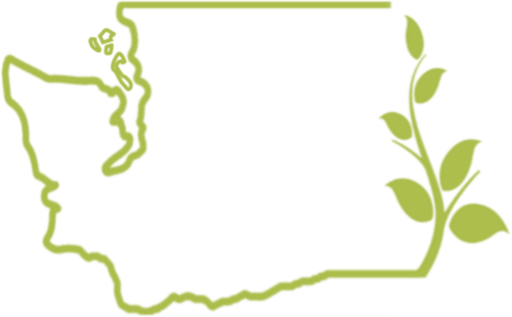
Seeds For Thought
A newsletter of the Master Gardener Foundation of Washington State
August 2024 – Volume 24, Issue 3
From the President
~~ Tana Hasart, MGFWS President
Next >>>
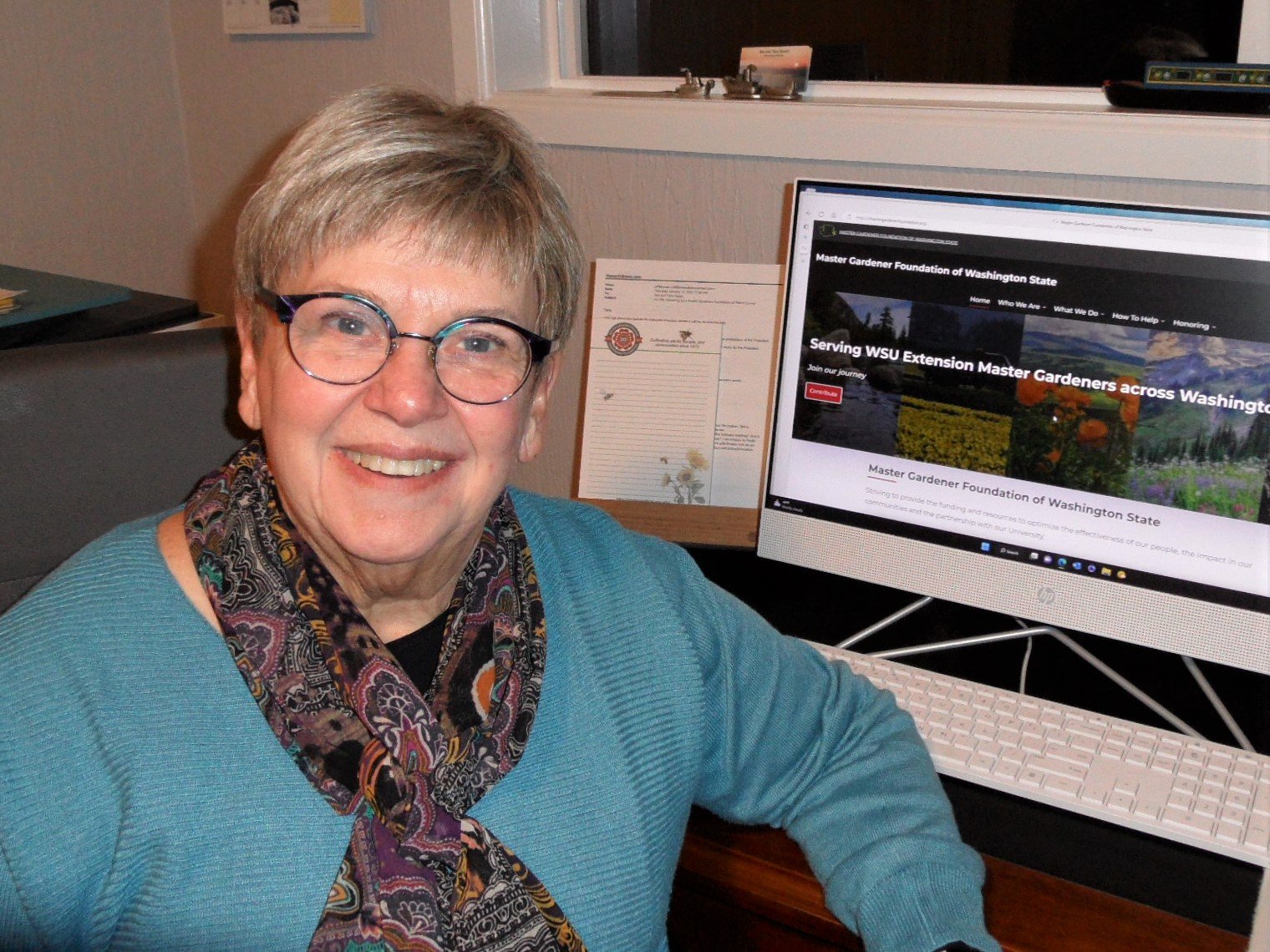
Succession Planning = Success
One of the most frequent questions received by the MGFWS is, “How do we manage succession planning?”. Accompanying this question are requests for ideas about recruiting, orienting, and engaging prospective leaders, keeping our Foundations viable and effective. Here are four steps that can help build leadership capacity and resiliency:
- Have a clearly documented strategic plan that guides future work. Knowing where your organization is going will help identify the talent and skills needed for current and future leadership.
- Develop a succession plan. How does your Foundation recruit, orient, train, and retain good leaders? Having specific steps in place ensures effective Board operations during times of transition.
- Create clear position descriptions. In order to be an effective leader, candidates must know what is expected of them and how they will serve and engage in the organization’s work.
- Document your recruitment strategy. What does a prospective candidate need to know? What is the annual timeline for recruiting new members? What methods will be used? How do you engage with all members of your organization, ensuring balanced representation and perspectives? What are the “talent gaps” that need to be filled? Be intentional about recruitment.
- Share information. How will a prospective leader enhance and strengthen your organization’s culture? What are the skills and experiences they bring? How well do they understand the role, responsibilities, and duties associated with service? What is their best learning style? What can they teach others? Hosting a conversation to explore these important topics improves the potential for retention of new and existing leaders.
Succession planning is not a difficult or complex process. By taking a systematic approach to recruiting and retaining talent, you will ensure your organization operates effectively over time.
Tana
From the Statewide Program Leader
~~ Jennifer Marquis, WSU Extension Master Gardner Program Statewide Leader
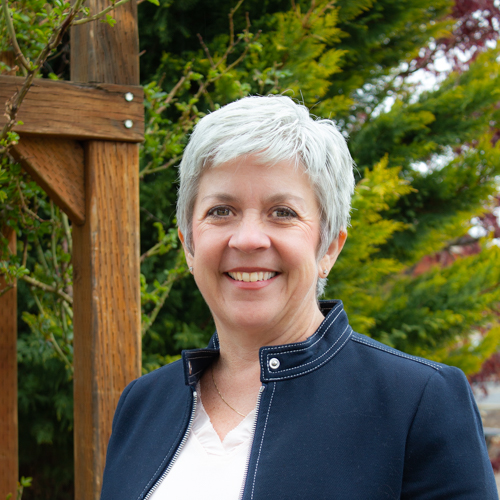
The WSU Extension Master Gardener Program in alignment with WSU CAHNRS and WSU is committed to creating an equitable and inclusive environment where all participants are valued and respected contributors. All of us have an important role to play in creating a positive culture where faculty, staff and volunteers have the privilege to share their time and talents in service to the community.
I saw a great example of creating an inclusive environment in the Island County MG Gazette. The demo garden team says, “volunteers are always welcome! There is always room for innovative ideas and contributions throughout the Education Garden. We will help you find a place to show your skills, whether they be in design, plant choice, pruning, nurturing, or any number of other activities in this thriving community garden. Join us from 9 am to noon on Wednesdays or on first and third Saturdays through August – July 6, July 20, August 3, and August 17.”
We know that diversity is a fact. Equity is a choice. Inclusion is an action and belonging is an outcome. The demo garden team in Island County is acting on making sure everyone is included in the activities of the garden and they go even further to say, come with new and innovative ideas and they will help you find a place to put your talents to work.
The WSU Extension Master Gardener Coordinators came together in mid-July for a 2 day retreat. One focus was on creating an inclusive environment for all volunteers. We learned about the 4 – P’s of communication. Pause Intentionally make tie and a safe space for sharing, for thinking, for capturing the feeling in a room together. Patience: Be tolerant with yourself and others. That takes time. Presence: Be there, but don’t be the center of it. Hear and value other perspectives with an open mind. Use ‘we’ and ‘together’ statements rather than ‘I’ statements. Participation: You can and should fully participate. It helps you safeguard the space so that other can share as well.
I’m certain we all want to build a WSU Extension Master Gardener Program full of engaged volunteers who participate in a variety of activities and feel empowered to plan implement and deliver mission and vision achieving programming. Who wouldn’t want more volunteers helping us out? To get there we have to stay true to our values and our code of conduct.
We all have the responsibility to know and hold ourselves and each other accountable to our program values.
- We value personal and professional research and discovery because it encourages us to stay current about horticulture and environmental stewardship to meet the unique educational needs of our communities.
- We foster and benefit from an atmosphere of diversity and inclusivity because our differences inspire creative thinking and innovative solutions.
- We act with integrity because trust, truthfulness and respect create a healthy and positive culture.
- We are committed to stewardship and sustainability, serving as ethical and responsible agents of our natural resources, human resources, and University resources.
- We collaborate because together we empower healthy and resilient communities.
- We are a dynamic and responsive program where knowledge inspires change.
Additionally, we must all know and hold ourselves and others accountable to our code of conduct. We are all representatives of WSU. As a WSU Extension Master Gardener Volunteer, you agree to:
- Represent WSU Extension with dignity and pride.
- Respect all persons with whom they interact as a WSU Extension Master Gardener (fellow volunteers, Extension and other county personnel, and the general public).
- Conduct themselves in a courteous, respectful manner and refrain from profanity, harassment, disruptive behavior, or abuse of any kind.
- Be a positive role model at all times.
- Respect and follow WSU, county, and program policies and guidelines.
- Comply with equal employment opportunity and nondiscrimination laws.
- Not consume alcohol, use marijuana, tobacco (including vapor products), or illegal substances while representing WSU Extension.
- Participate as team members within the WSU Extension Master Gardener Program.
Thank you all for your dedication to the WSU Extension Master Gardener Program and for your active engagement in creating a positive culture where volunteers, staff, and faculty can share their time and talents in service to community.
A New Horizon for Karen Gilliam
~~ Erin Moore and Whatcom County Master Gardeners
For years, veteran WSU Whatcom Master Gardener Karen Gilliam has helped and heartened home gardeners with her wise and gentle approach to horticulture. In June she leaves Whatcom County for the blue skies of Wyoming.
Karen is celebrated at the Washington State University Extension program locally and at the state level for the dedication and contributions she has made. She was named State Master Gardener of the Year in 2017 and received the presidential award in 2021 for her volunteer service to our community. Karen has also served many leadership roles in the Whatcom County Master Gardener Foundation.
Leaving Whatcom County feels bittersweet. “I have mixed feelings about leaving my garden and all my master gardener friends,” she says, “But our daughter and her family are in Sheridan, Wyoming, and it is time to be closer to them. We have a home just two miles from them on half an acre. We are looking forward to exploring the area with the Big Horn Mountains very close. It will be a totally new gardening experience.”
Karen helped create the WSU Whatcom Extension demonstration gardens at Hovander Homestead Park over thirty years ago. She masterminded the labeling and “potting up” of plants dug and donated from her home and from the gardens of other local master gardeners. These plants fill the yearly master gardener spring sale at Hovander Homestead Park. Consequently, plants from Karen’s forest garden are a “green legacy” to home gardens all around Whatcom County.
Karen was raised in Northwood on a dairy and poultry farm northeast of Lynden. At eight years old, she was given a portion of the vegetable garden as her own. Excited, flower catalog in hand, she ordered a banana plant. She still remembers that when it arrived “it had frozen on the way and was a bag of mush.”

Karen met her husband Jerry while attending Washington State University in Pullman. This summer they will have been married 59 years.
Photo Courtesy of Karen GilliamKaren met her husband Jerry while attending university at WSU. This summer, 2024, they will have been married 59 years. “From the first Jerry and I did a lot of camping. We started with a teardrop trailer and a large dog. Over time our trailers got larger and the dog smaller.” Jerry worked as a meat cutter and then for the gas company as a serviceman. In 1976, Karen signed up for the WSU Master Gardener training. It was early in the extension program’s history. She says that she first read about it in the newspaper.
“The training was more in depth than I could have imagined. I found out that I know nothing about gardening.” But through the class, she says, “Not only did I become a more knowledgeable gardener (and I am still learning new things every day), it has brought me many, many good friends.”
After a long career mentoring new master gardeners, she reflects: “The classes have changed very much for the better, from recommending toxic chemicals in the ‘70s and ‘80s to the mostly organic practices of today.”
Karen met Marcy Plattner, another master gardener and founder of Bellingham’s the Garden Spot, in that same class, and Karen started working at the plant nursery from its opening and continued there for ten years.
In 1986, she and Jerry moved to a five-acre property on Clarkson Lane east of Ferndale. She says, “For the first two years, we logged to create an open area around the house. I brought home most of my pay from the Garden Spot in plants.” Their forest garden began to take shape.
“Slugs where everywhere that first year. We decided to count all that we picked and disposed of, and many evenings spent with flashlights brought the count to 60,000 slugs!” Karen participated in a national experiment, testing several organic methods to keep slugs at bay. “The only one that worked was the copper-surround. The slugs get a shock as they try to crawl over cans wrapped with copper, and almost all are repelled.” The results were published in the National Gardening Association’s magazine.
Today, a creek runs through openings and forest rich in habitat and plant diversity. Ferns, hostas, and wild ginger are among hundreds of different species growing beneath an overstory of forty-year-old flowering trees and shrubs and towering grand fir and red cedar.
Karen’s advice for new gardeners? “To make your gardening easier, never let a weed go to seed, and keep a good mulch on at all times. Time goes by so quickly. Have patience and enjoy the process.”

In the 2000s, Karen and another master gardener friend started working with hypertufa, a lightweight concrete mixture. “We also gave classes in garden art. It was very satisfying.”
Photo Courtesy of Karen GilliamAnd her plant favorites? “Oh, I have so many favorites. They change every day. However, I have gotten so that–although the flowers are wonderful–the foliage has to speak to me. The leaves are there for many months while the flowers are usually fleeting.”
She pauses. “Today, I’d say hostas win if you have shade. They come in many colors and shapes. For sunny spots, the purple coneflower, echinacea, should be in all gardens. For shrubs, I like deutsia and viburnums, they are always dependable. And the paperbark maple tree can’t be beat for four season interest with its peeling bark and easy care.”Karen smiles mischievously: “But ask me tomorrow and you’ll get a different answer.”
Read past news about Karen at the Lynden Tribune
2024 WSU Master Gardener Advanced Education Conference
~~ Joyce Frazier, 2024 AEC Marketing
The Master Gardener Foundation of Washington State, in partnership with the WSU Extension Master Gardener Program, hosts the virtual 2024 Advanced Education Conference, Gardening in a Changing Climate, on September 27 – 28. Join us as we cultivate knowledge, nurture passion, and grow a greener future. The conference provides exceptional opportunities with high-quality classes and instructors.
Our keynote speaker, Rebecca McKackin, will present Adventures in Ecological Horticulture. For ecological horticulturist Rebecca McMackin, cultivating habitat is central to landscape management.
Join Rebecca as she teaches us how to use ecological insight and experimentation to develop new management strategies and why careful observation and documentation of the insects, birds, and other wildlife in your gardens are crucial to their success.
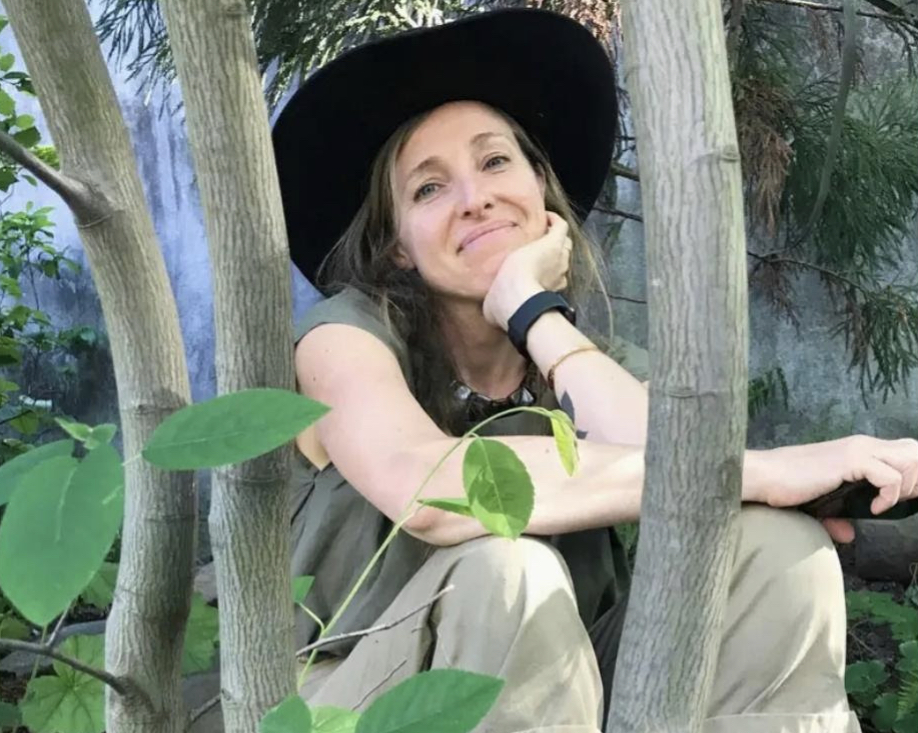
The conference features 36 live and recorded classes focusing on research-based gardening and environmental stewardship practices. Join us as we enjoy presentations on climate change, water scarcity, preventing food waste, compost and soil health, lawn alternatives, natives, cultivars and perennials for a changing climate, native bees and other pollinators, planting for birds and wildlife, biodiversity in plants, nearby nature, mosses, and lichens and so much more.
The conference supports the leadership skills of Extension Master Gardener Volunteers and keeps them abreast of cutting-edge horticultural science. This educational event is just one way we strive to ensure that when you reach out to your local Extension Master Gardeners, you are assured of getting innovative, unbiased, scientifically supported advice.
The WSU Extension Master Gardener Program and Master Gardener Foundation of Washington State intend this virtual platform to provide a harmonious blend of affordability and accessibility, enabling conference attendees to benefit from the wealth of research-based knowledge and expertise shared during the event.
The Advanced Education Conference is virtual and open to the public. We aim to empower garden enthusiasts with knowledge, inspiration, and sustainable practices. Hosting this conference on a virtual platform allows us to minimize our environmental footprint and have leading instructors and researchers from across the United States. There are no expenditures for travel or accommodations. After the conference, everyone registered will receive access to all recordings for 30 days.
Join us on September 27 and 28 for this incredible learning opportunity. The low cost for the Advanced Education Conference is only $139. That is only $3.86 per presentation. Register at WSU Extension Master Gardener Advanced Education Conference
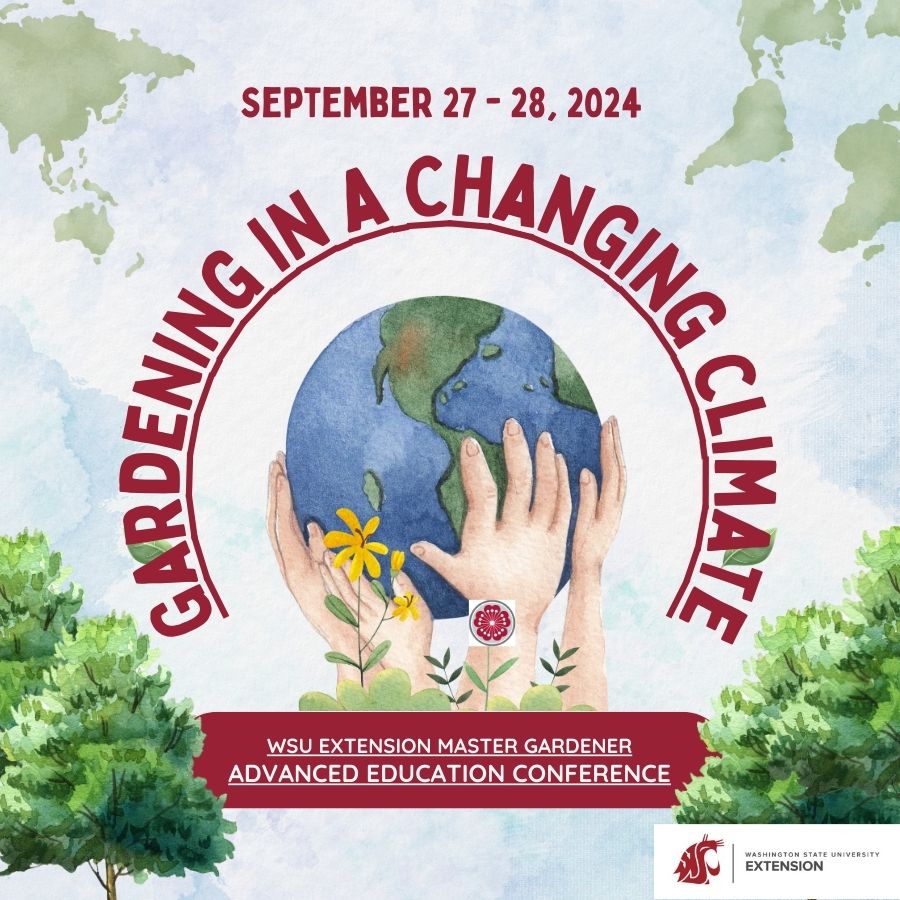
The Master Gardener Foundation of Washington State is instrumental in providing funding to advance the Master Gardener Program and education through horticultural-based research generated through Washington State University and affiliated university systems. WSU Extension Master Gardeners empower and sustain diverse communities with relevant and unbiased, research-based horticulture and environmental stewardship education.
Essential Oils or Caffeine to Deal with Slugs!?
~~ Alice Slusher, Cowlitz County Master Gardener
I’ve been researching two recent announcements by OSU professors about slug and snail management options–caffeine and essential oils. I’m reporting my findings. Thought you all might be interested.
Disclaimer: Both of these solutions are still being researched and have not been approved by WSU for pest management. This means that we cannot, as Master Gardeners, share this information with people who ask us about managing slugs and snails. These are PNW Handbook’s recommendations for managing slugs. https://pnwhandbooks.org/insect/ipm/slug
Here are a couple of ideas that are being researched, and both are easy to test at home.
Rory McDonnell, OSU’s premier slug-guru, is currently doing research about using essential oils to repel and kill slugs. In a recent interview, he says that cloves, thyme, and spearmint essential oils are even more effective at killing slugs than the currently available products containing metaldehyde (which is toxic to humans, pets, wildlife, and aquatic life). In the interview, he said that thyme seemed to be most effective. It doesn’t take much—only 1%-2% essential oil in water works well and does not cause phytotoxicity (plant tissue damage) on leaves. (Note: products like Sluggo that contain iron phosphate as the active ingredient are considered to be non-toxic)
To make a spray: To create a 2% solution in 1 quart of water, use a little less than four teaspoons of clove, thyme, or spearmint essential oil. Shake well. If spraying on leaves, be sure to first test it on a leaf after it’s been exposed to the sun over several days.
Another trick he uses for container plants is to mix a little essential oil with petroleum jelly and smear it around the edge of the pot.
There are at least two commercially available products approved for use in WA that contain essential oils as active ingredients. Of course, read and follow the label directions:
All Natural Snail & Slug Spray Rtu (ready to use)
Dr. Earth Final Stop Snail & Slug Killer Spray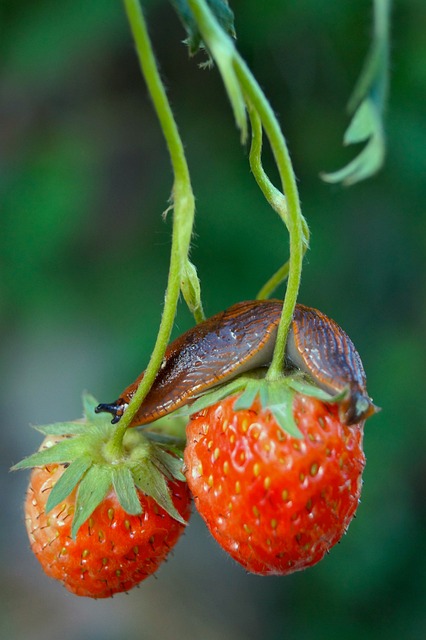
photo by lunahaarmann via Pixabay,
used under the Pixabay Content LicenseAnother article from the University of Hawaii suggests that using strong brewed coffee in a 1:9 ratio with water is an effective molluscicide spray, too.
“Large slugs were killed by spray applications containing 1–2% caffeine… We conclude that slugs can discriminate between treated and untreated leaves and that caffeine significantly reduces feeding at a concentration of only 0.01%. We found that large slugs placed on loose soil and sprayed with a 1 or 2% solution of caffeine responded with uncoordinated writhing; the only survivors were the few that were able to burrow into the soil soon after treatment.”
Linda Brewer, a soil scientist from OSU suggests:
To make a 1% to 2% soil drench, add 1 part water to 2 parts strong brewed coffee. For example, use 1 cup of water for 2 cups of coffee. To reduce slug feeding on foliage, add 9 parts water to 1 part brewed coffee and apply as a spray. “A sensible approach would be to apply diluted coffee to a sample of leaves and wait for a few hot and sunny days to watch for leaf burn or other damage,” Brewer said. “If there’s no damage, go ahead with spraying.”
More resources:
Gardening with (and without) slugs and snails | OSU Extension Service (oregonstate.edu)
Grow Smart Grow Safe—controlling slugs and snails—options: https://www.growsmartgrowsafe.org/Products?pesticideTypeId=16
Know thy slugs: https://www.oregon.gov/oda/shared/Documents/Publications/IPPM/ODAGuideMolluscs2016ForPress.pdf
Slug Portal—OSU—everything you EVER wanted to know about slugs
Backyard Biochar: Facts for Home Gardeners
~~ Barbara Farout, Jefferson County Master Gardener
The essence of gardening is in the soil. Our goal is well-drained, uncompacted soil with 20-30% air, 20-30% water, 5% organic matter, and 45% dissolved minerals (a mix of sand, silt, and clay).
Healthy soil can “self-organize” to achieve an effective flow of nutrients, air, and water. So how can we improve soil and add organic matter without disturbing its natural structure?
Options include biochar, compost, and mulch. The best approach probably includes a combination of materials, depending on the specific qualities of your soil.
Let’s start with biochar, a fine grain, porous, charcoal-like substance. It is created when biomass (such as wood, crop residues, coconut husks, or manure) is carbonized by high temperature processing in the absence of oxygen, a process known as pyrolysis.
Biochar has been used to improve soil fertility in indigenous farming since the pre-Columbian era. The carbon found in the rich, dark soils of the Amazon rainforest and in West Africa – formed from bone, manure, and charcoal – has persisted for thousands of years. The biochar remains in the soil, binding and retaining minerals and nutrients available for plants.
Research is underway to better understand why and how the char affects soil, but four main effects are clear – aeration, water holding capacity, nutrient retention, and long-term carbon sequestration.
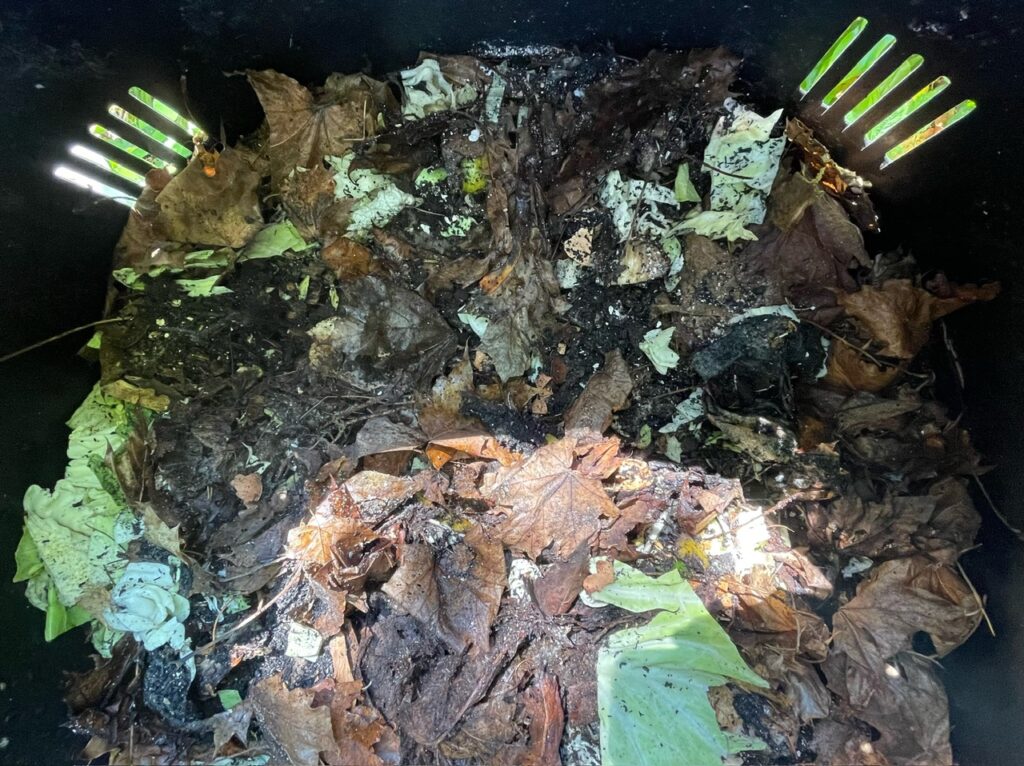
Fine, porous biochar is layered on a compost bin with vegetable scraps and dried leaves. When the compost is ready, the biochar is ready to be used in the garden. Photo courtesy of Barbara Faurot In the home garden, porous biochar can improve aeration and drainage of poorly drained or compacted soils, helping with resistance to root and leaf diseases. It can also improve drought tolerance by increasing the water holding capacity of fast-draining or sandy soils. Overall, biochar has a positive effect on beneficial soil microbes. It provides a physical “home” for beneficial mycorrhizal species and reduces leaching of nutrients during rainy periods.
Compost offers some similar benefits as biochar – aerating the soil, minimizing compaction, improving drainage, and increasing nutrients and nutrient-holding capacity. A key difference is that biochar persists in the soil for hundreds to thousands of years, compared to months or a few years for compost.
Coarse organic mulches such as arborist chips or shredded leaves offer complementary benefits: preserving soil moisture and temperature, suppressing weeds, and enriching the soil. Both biochar and compost can be used as mulch, or in combination with other mulching materials, to top dress planting areas.
There is solid evidence that co-composting – combining biochar and compost – can improve soil health and microbial activity. Doug Van Allen, WSU Extension Master Gardener, volunteers at the Port Townsend High School Food Garden and Blue Heron School’s fruit tree orchard. In Doug’s experience, “adding biochar to compost gives it a nice ‘feel’ and certainly helps with moisture retention.”
Francesco Tortorici, founder of Olympic Biochar, confirms that a simple, effective way to use biochar is to add it to the compost process: “When the compost is ready, the biochar is ready.” The compost charges the biochar, introducing microbes and nutrients. There is also evidence that biochar can reduce some greenhouse gas emissions such as nitrogen, which can then become bioavailable to plants.
Francesco suggests gardeners experiment with biochar as citizen scientists. “Get the biochar into the ground, and observe your results. Try it and have fun!”
Francesco agrees with other experts that testing small areas first is the best approach. The stability of biochars suggests that a single application can remain effective for thousands of years. That’s why it’s critical to use a reputable source.
“Know your source,” Francesco advises. The quality of biochar and its chemical and physical properties depend on the materials used to produce it and the temperatures and times used in pyrolysis. Olympic Biochar, for example, is produced in Port Townsend from high grade tree bark and wood products, free of lead-based paints or treated lumber. Some ash is removed, resulting in a pH that is closer to neutral than in many biochars.
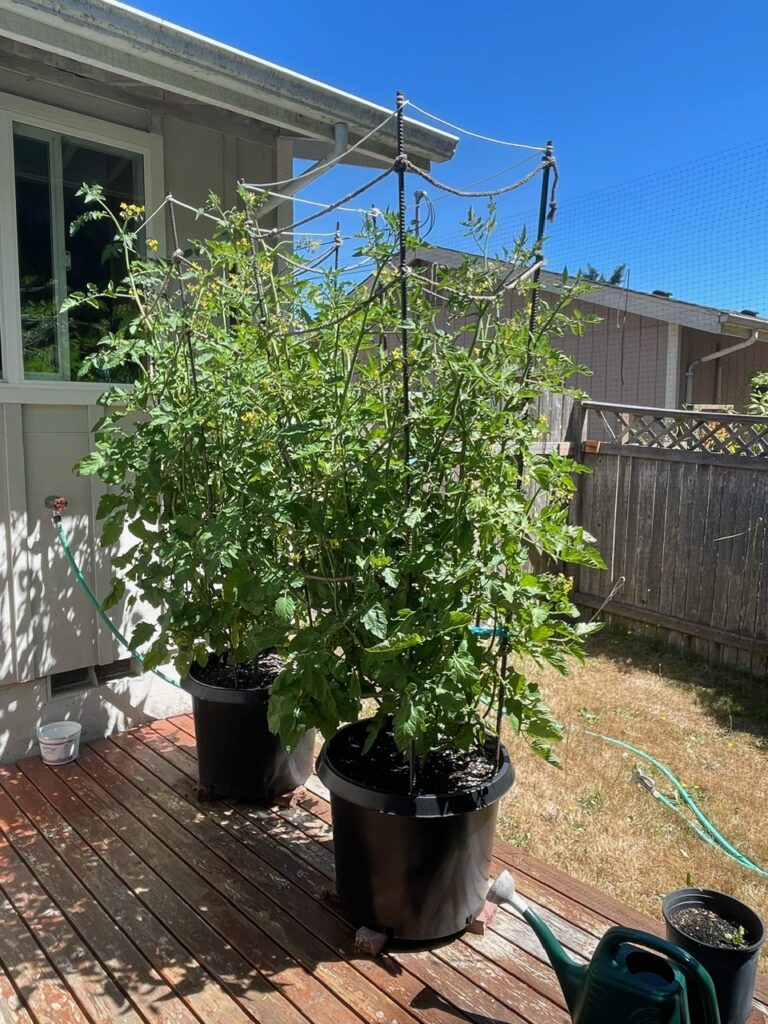
Sungold cherry tomatoes grow in 20 gallon pots in a blend of potting mix and co-composted biochar. At the end of the season, the potting mix can be re-blended with fresh compost and biochar to be reused the following year. Photo courtesy of Barbara Faurot “Producing biochar at home can be fun,” adds Francesco. “It’s important to have the right apparatus and skill level if you want to make it yourself.” Safety precautions are essential. Francesco suggests information by Kelpie Wilson, found on the non-profit US Biochar Initiative’s YouTube channel, to learn more.
A few additional cautions: too much biochar can injure plants, cause excessive soil alkalinity, or damage some beneficial organisms like earthworms. Its effectiveness depends on the soil texture, organic content, and mineral nutrient levels already present. Adding biochar to soils already rich in organic matter can temporarily reduce nitrogen levels, since increased microbial activity may compete with plants for nitrogen.
Francesco points out that a single farm or garden may have several different soil profiles, so soil testing is the best way to determine whether nitrogen or any trace minerals are deficient.
Also, note that biochar and compost may not be substitutes for fertilizer if you’re trying to grow crops that have a high nutrient demand. A soil test can help determine specific needs.
Published in the Port Townsend Leader August 9, 2023
Gini Obert Honored by Selah School District
~~ Reggie Sanderson, Yakima County Master Gardener
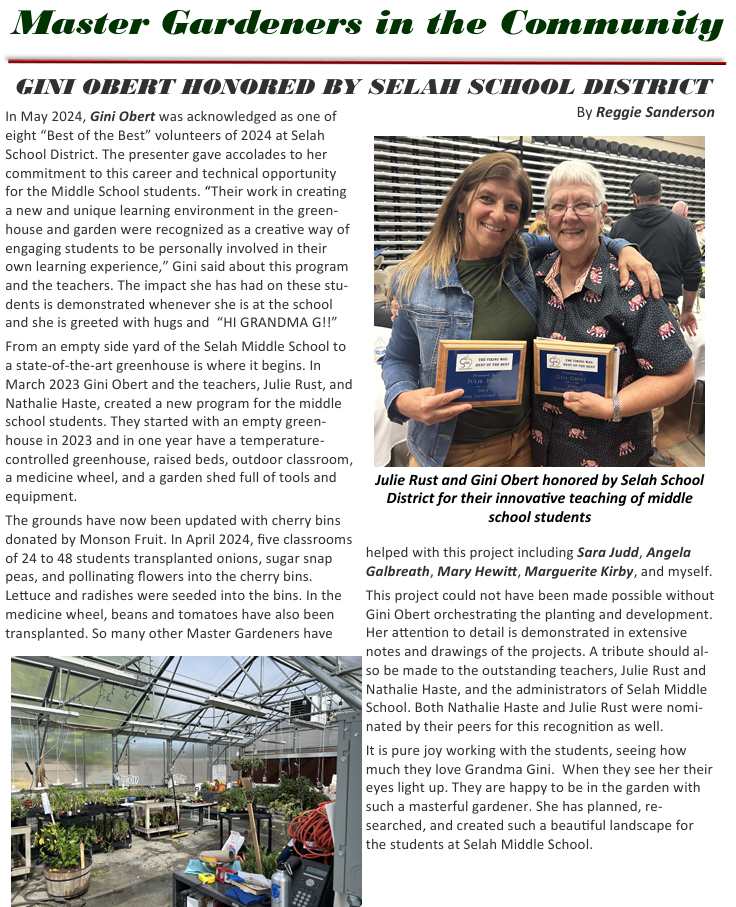
Dirt Cheap Garden Magic
~~ Master Gardener Foundation of Thurston County
“Dirt Cheap Garden Magic”
Reuse, Recycle and Redesign your landscape for less money and less maintenance.Presented by Marianne Binetti
Join Marianne as she wields her magic wand to share ideas to add plants you have propagated to your garden or be creative and redesign around garden art made from found objects. Want to repurpose household items and learn how to recycle everything from old carpets to coffee grounds? Pick up some easy maintenance ideas to lighten your garden work delivered with light-hearted style and fun ideas.
******************
DATE: Thursday, September 12, 2024
TIME: 6:30 p.m.
WHERE: Virtual Presentation (via Zoom)
COST: $35 per registration
WHAT: Helpful Gardening Tips and Prize Drawings
Registration Information: www.mgftc.org
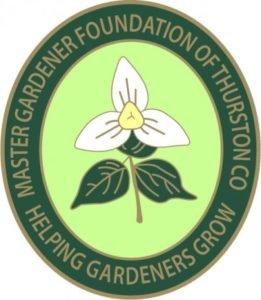
The Master Gardener Foundation of Thurston County (MGFTC) will host their fifth virtual fundraiser with local gardening expert Marianne Binetti entertaining and informing with creative garden ideas. This online event (via Zoom) begins at 6:30 p.m. and includes several prize drawings.
Binetti is the local area’s national gardening celebrity sharing her passion for gardening with hilarity and witty wordplay. A Grand Prize drawing will be held at the end of the presentation for a future private tour of Marianne Binetti’s garden for up to ten people!
Funds raised from this event support education and enhancements at three demonstration/learning gardens in Thurston County (Olympia Farmers Market Garden, Closed Loop Park at the county waste management site, Dirt Works behind Yauger Park), a Q/A Clinic and free outreach programs in gardening, composting and recycling related topics throughout the county.
Seeds for Thought is a quarterly publication of the Master Gardener Foundation of Washington State. Submissions, corrections, and comments can be emailed to the Editor, Erin Hoover
Seeds for Thought Copyright 2016-2024 Master Gardener Foundation of Washington State
Previous newsletters